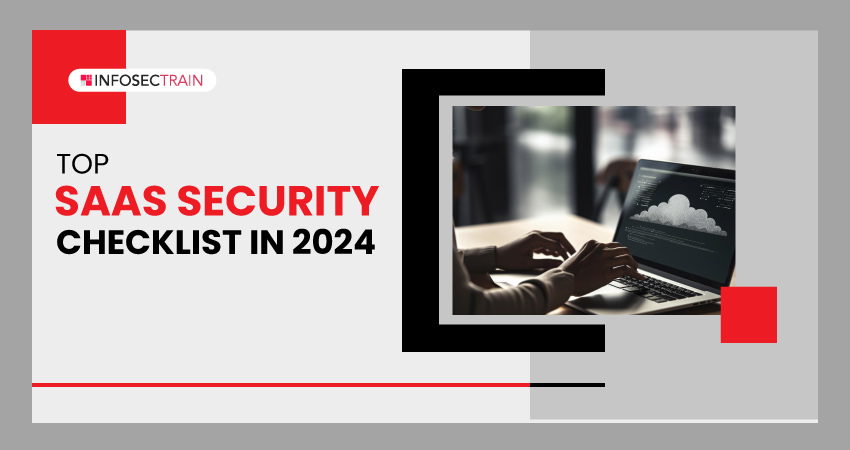Top SaaS Security Checklist in 2024
As the cyber landscape continually evolves, prioritizing the protection of your SaaS (Software as a Service) stronghold has become crucial. As we enter 2024, we must reinforce the range of security measures to fight off sophisticated cyber threats. To ensure SaaS security in 2024, adopt a proactive and all-encompassing approach. Through the active implementation of these measures, you secure your digital assets and send a strong message to potential intruders—your digital fortress is impervious, and your data remains beyond reach. Maintain unwavering vigilance, uphold robust security practices, and fortify your digital kingdom against the ever-present and evolving threats of the cyber realm.

What is SaaS Security?
SaaS security, also known as Software as a Service security, involves implementing measures and practices to protect data integrity, confidentiality, and availability within cloud-based software applications. As organizations increasingly depend on SaaS solutions to streamline operations, protect sensitive information, and enhance collaboration, prioritizing these applications’ security becomes essential.
Risks Associated With SaaS Security
- Malware Attacks: Cybercriminals inject malware into SaaS applications to steal data or disrupt operations. This tactic involves deploying malicious Software within the application, providing unauthorized access, or causing operational disturbances. The injected malware poses a significant threat by compromising the security and functionality of SaaS platforms.
- Compliance Violations: Failure to comply with various compliance requirements poses a risk for organizations utilizing SaaS applications to process sensitive data. Companies adhering to these regulations could incur fines and other penalties for non-compliance. The use of SaaS applications introduces the imperative for organizations to diligently adhere to applicable compliance measures.
- Data Breaches: SaaS applications’ vulnerabilities are exploited by cybercriminals to illicitly access sensitive data, posing a potential risk of data breaches. This tactic involves identifying weaknesses in the security of SaaS platforms, allowing illicit access to confidential information.
Why Is SaaS Security Important?
- Reduces the Risk of Data Breaches: SaaS security plays a crucial role in mitigating the risk of data breaches by actively identifying and addressing vulnerabilities within SaaS applications. Through this process, potential points of exploitation are identified and promptly remediated, contributing to a more robust defense against unauthorized access and data compromise. Implementing SaaS security measures is an essential proactive step in safeguarding sensitive information and reducing the likelihood of data breaches.
- Improves Compliance: SaaS security enhances organizational compliance by facilitating adherence to various regulatory requirements, including PCI DSS and HIPAA. This entails implementing measures and practices within SaaS applications to align with the specified standards, ensuring regulatory mandates handle sensitive data. By incorporating SaaS security protocols, organizations bolster their capacity to meet compliance obligations, fostering a secure and regulatory-compliant environment for the processing and storing sensitive information.
- Reduces the Risk of Business Disruption: SaaS security safeguards against the risk of business disruption by minimizing the impact of malware attacks and denial-of-service incidents. By implementing robust security measures, organizations can fortify their SaaS applications, making it more challenging for cyber threats to disrupt normal business operations. This proactive approach to SaaS security helps ensure continuity and resilience, mitigating the potential for downtime and disruptions that could result from malicious activities.
SaaS Security Checklist For 2024
- Data Encryption: Secure your data comprehensively by implementing encryption for all information, whether at rest or in transit. This includes safeguarding sensitive customer data, financial records, and intellectual property. Encryption is a digital shield, rendering your valuable information indecipherable to unauthorized entities and ensuring a robust defense against potential security breaches.
- Access Control: Establish precise access controls to ensure users can only access the resources essential to their roles. By implementing granular access control measures, you create a digital barrier that restricts unauthorized access, enhancing your system’s overall security posture. This approach minimizes the risk of unauthorized individuals gaining entry to sensitive information or functionalities, contributing to a more secure and controlled environment.
- Multi-factor Authentication (MFA): Mandate Multi-factor Authentication (MFA) for all users, including those with privileged access. MFA enhances security by necessitating users to provide two or more authentication factors during login, fortifying the authentication process. The added layer of protection considerably diminishes the risk of unauthorized access, ensuring that even if one component is compromised, potential intruders face an additional obstacle to overcome.
- Security Information and Event Management (SIEM): Incorporate a Security Information and Event Management solution to actively monitor and analyze security logs for any signs of suspicious activity. SIEM is a vigilant digital guardian that constantly scrutinizes system events to detect anomalies or potential security threats. This proactive approach allows for swift identification and response to irregularities, enhancing your system’s overall security posture.
- Identity and Access Management (IAM): Deploy a robust Identity and Access Management (IAM) solution to oversee user identities effectively and control access permissions. IAM serves as a digital gatekeeper, ensuring users are granted appropriate access based on their roles and responsibilities. By implementing a comprehensive IAM solution, you establish a structured framework for managing user identities, reducing the risk of unauthorized access, and fortifying the overall security of your system.
How can InfosecTrain Help?
As organizations increasingly rely on cloud environments, the demand for skilled professionals to secure these critical systems is rising. InfosecTrain, a leading consulting company, specializes in various IT security training and information security services. If you’re aspiring to kickstart a career in cloud security, consider enrolling in InfosecTrain’s cloud security training courses. Our seasoned professionals will impart extensive knowledge of cloud security standards and best practices across a broad spectrum of topics, equipping you with the skills needed to meet the growing demand in the industry.






 1800-843-7890 (India)
1800-843-7890 (India)